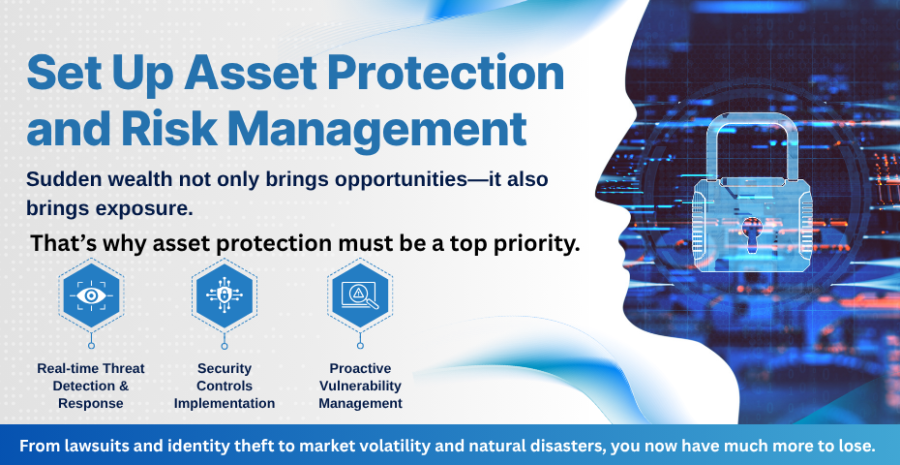
.png)
Sudden wealth can feel like winning life’s lottery—a long-lost inheritance, the sale of a business, a legal settlement, or a lucky crypto investment. Whatever the source, the arrival of unexpected financial abundance has the power to completely alter your life.
Yet, as exciting as it is, sudden wealth often comes with hidden dangers. Without the right mindset and proper strategy, what seems like a life-changing opportunity can quickly become a short-lived mirage. Stories abound of lottery winners and athletes who earn millions only to return to financial struggle within a few short years.
Why does this happen? Because managing sudden wealth is not simply about spending less or saving more. It’s about fundamentally shifting the way you think, act, and plan around money.
Most people are not prepared for the emotional and practical shifts that come with wealth. You might feel overwhelmed, confused, or even anxious about what to do next. Friends and family might treat you differently. Old financial habits may no longer apply, and without a structure, sudden wealth can vanish just as quickly as it appeared.
That’s why financial education, emotional discipline, and strategic thinking are absolutely vital. Managing a sudden windfall requires clarity, patience, and professional support. It's not about buying the biggest house or investing in the next hot stock.
It’s about building a financial foundation that can serve not only your immediate desires but your future aspirations, your family’s security, and your legacy.
The truth is, the transition from financial normalcy to sudden affluence is not merely a numbers game—it’s a mental and emotional transformation. It involves redefining your relationship with money, making long-term decisions, and resisting the urge to impress or overspend.
With the right guidance, your sudden wealth can be more than a fleeting high; it can become a powerful engine for freedom, security, impact, and peace of mind.
So if you’ve come into money—or anticipate doing so—this blog will outline the seven most important financial strategies to help you turn sudden wealth into lasting wealth.
Let’s explore the principles that will empower you to manage, multiply, and protect your newfound fortune for years to come.

One of the most common mistakes people make after receiving sudden wealth is rushing to spend or invest it without a clear plan. It’s understandable—you’ve just come into a large amount of money, and the temptation to fulfill long-held dreams is strong.
However, acting too quickly can lead to poor decisions that permanently erode your wealth. The first and most crucial step is to pause. Take a breath. This is a moment to reflect, not react. Even though your financial situation has changed, your life doesn’t need to change overnight.
Resist the pressure from others to “do something” with your money immediately. Instead, give yourself time to emotionally process this new reality. Establish a period of at least 90 days where no major purchases or investments are made.
This cooling-off period helps you avoid decisions driven by emotion, social pressure, or fear of missing out. Use this time to gather information, interview professionals, and consider what truly matters to you. What do you want your wealth to do for your life—not just in the next year, but over the next 10, 20, or 50 years?
Sudden wealth is a powerful tool. Don’t treat it like a temporary windfall—treat it like the foundation of your future.
.png)
You wouldn’t go mountain climbing without a guide—and you shouldn’t try to manage a windfall alone either. Wealth brings complexity: taxes, estate planning, investing, legal protection, and risk management. That’s why assembling a team of qualified, trustworthy professionals is essential.
Your core team should include a Certified Financial Planner (CFP), a tax advisor or CPA, an estate attorney, and possibly an insurance expert. These professionals should have experience working with high-net-worth individuals, not just average earners.
Their job isn’t to tell you what to do—it’s to help you explore your options, evaluate risks, and build a holistic plan based on your unique goals. Don’t rush this process. Interview several candidates. Ask questions. Choose people who educate you and align with your values—not just those with impressive credentials.
Be cautious of anyone who pressures you into quick decisions or promotes overly aggressive investment strategies. Your wealth team should work together, communicate clearly, and act in your best interest.
With the right advisors in place, you’ll have the clarity and confidence to make smart decisions—and avoid costly errors.

Wealth without purpose is a recipe for waste. That’s why creating a comprehensive financial roadmap is critical. This plan should reflect your core values, life priorities, and long-term goals.
Are you passionate about supporting your children’s education?
Do you want to retire early, start a foundation, or travel the world? Start by writing down what truly matters to you.
Then, align your financial goals around those priorities. A strong financial roadmap will include short-term needs (like liquidity), medium-term goals (such as buying property or funding a business), and long-term objectives (like estate planning or generational wealth).
Include specific targets, timelines, and benchmarks. Importantly, your plan should be flexible. Life changes—and your roadmap should be reviewed and adjusted at least annually.
When your money is aligned with your values, you’re less likely to make impulsive choices and more likely to build a fulfilling, purpose-driven life.
Your financial roadmap is your North Star—it helps you stay focused, disciplined, and intentional as you navigate the new terrain of wealth.

Sudden wealth not only brings opportunities—it also brings exposure. From lawsuits and identity theft to market volatility and natural disasters, you now have much more to lose. That’s why asset protection must be a top priority.
Start by working with your team to evaluate your current insurance policies and expand coverage where needed.
This may include umbrella insurance, liability protection, property insurance, and coverage for high-value assets like art, jewelry, or collectibles. If you own a business or real estate, consider using legal entities such as LLCs or trusts to shield assets from personal liability.
Estate planning tools like irrevocable trusts can also safeguard wealth from creditors and ensure it’s passed on according to your wishes. Risk management isn’t about paranoia—it’s about being proactive. The more you protect your assets now, the more peace of mind and long-term security you’ll enjoy.
A strong shield around your wealth is just as important as the strategies you use to grow it.

Sudden wealth can create the illusion that the money will never run out. But history shows that many people burn through millions in just a few short years. Why? Because they fail to develop a sustainable lifestyle and budget.
You need a clear, detailed spending plan that reflects both your new financial reality and long-term vision. Start by understanding your current expenses, then identify new spending categories that may arise—such as philanthropy, luxury purchases, or travel.
Allocate funds across three main buckets: essentials, lifestyle, and growth. Essentials include housing, insurance, and taxes. Lifestyle covers travel, entertainment, and personal interests. Growth includes investments, education, and entrepreneurial ventures.
A good rule of thumb is to live on no more than 4-5% of your total net worth annually. This ensures your principal continues to grow and support your life for decades. Remember: wealth isn’t about spending big—it’s about spending smart.
Discipline and intentionality are your new best friends.

Now that you have a financial base, it’s time to grow it intelligently. Investing isn’t about chasing the hottest trends—it’s about creating a balanced, diversified portfolio tailored to your goals and risk tolerance.
Work with your financial advisor to allocate assets across different classes—stocks, bonds, real estate, and possibly private equity or alternative investments. Your strategy should include both growth (to increase net worth) and income (to generate cash flow).
Don’t put all your eggs in one basket. Diversify across industries, geographies, and asset types. If you have entrepreneurial leanings, you may allocate a portion of your wealth to launch or invest in businesses—but never bet the farm.
Maintain liquidity for emergencies or unexpected opportunities. Remember, wealth-building is a marathon, not a sprint.
The power of compounding, smart diversification, and patience will do far more for your future than any get-rich-quick tactic ever could.

True wealth isn’t just about what you accumulate—it’s about what you leave behind. Legacy planning is the final, but deeply meaningful, step in managing sudden wealth.
Think beyond your lifetime. How do you want to impact your family, community, or cause? Your estate plan should address inheritance, charitable giving, and wealth transfer.
Consider setting up trusts, donor-advised funds, or foundations that allow you to give with intention and structure. Communicate openly with your heirs to prepare them for what they will receive—and educate them on how to be good stewards of the wealth.
Legacy isn’t just about money—it’s about values, stories, and impact. By making thoughtful choices now, you ensure your wealth will live on for generations and serve something far greater than your own lifestyle.
Sudden wealth is a powerful force—one that has the potential to elevate your life or unravel it. The difference lies in how you respond. Instead of letting emotion, pressure, or uncertainty drive your decisions, anchor yourself in strategy, education, and values.
Managing wealth isn’t just about avoiding mistakes—it’s about actively designing the life you want to live and the legacy you want to leave. It starts with slowing down, getting expert advice, and defining your financial goals. From there, it’s about protecting your assets, creating sustainable systems, and investing wisely.
Wealth offers freedom—but freedom without wisdom can lead to ruin. That’s why it’s so critical to cultivate discipline, patience, and perspective. The strategies you’ve read today are not quick hacks—they’re principles for life.
If you embrace them, you can transform a financial windfall into long-term stability, purpose, and peace of mind. Whether you’re sitting on a sudden fortune now or expect one in the future, remember this: real wealth is not measured by what you gain, but by what you wisely grow, protect, and pass on.
The choice is yours—make it count.
....................................................................................................................................................................................................
About: Andries vanTonder
Over 46 years selfemployed
He is a Serial Entrepreneur, an Enthusiastic supporter of Blockchain Technology and a Cryptocurrency Investor
Find me: Markethive Profile Page | My Twitter Account | My Instagram Acount | and my Facebook Profile.
